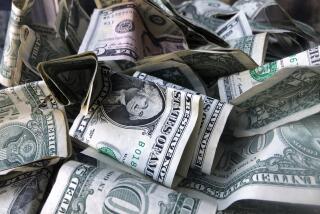Finding a fortune and losing everything
- Share via
Finders Keepers
The Story of a Man Who Found $1 Million
By Mark Bowden
Atlantic Monthly Press; $23, 210 pages
*
“FINDERS Keepers” is a brisk, sad story about a feckless young longshoreman in South Philadelphia who found a package of $1.2 million in $100 bills that bounced out of an armored truck near his home one February day in 1981.
For a week, the tale of how the money was lost from a truck taking it from the Federal Reserve Bank of Philadelphia enchanted the local media. For a week, the finder, Joey Coyle, tried to hide it, tried to multiply it.
But he was as inept as the Philadelphia police and the FBI were dogged. Coyle was so excited by his sudden good fortune that he couldn’t help bragging about it. He told his friends, his girlfriend, a bartender he didn’t know.
As Mark Bowden, a former Philadelphia Inquirer reporter and author of three other books, including “Black Hawk Down,” accurately reports, South Philly is a close-knit clump of ethnic neighborhoods. There are few secrets.
Coyle had none of his own left by the time he finished broadcasting his luck. Along the way he had gone to a local representative of organized crime -- “he had connections,” Coyle said -- to help him invest some of the loot.
After he was caught at the end of the week, as he tried clumsily to flee the country, the press tried to portray him as a lovable boy-next-door type who just got carried away. All that money, after all. What would you do? The armored car company was insured, wasn’t it? The Federal Reserve wouldn’t miss it, would it? Nobody would really lose, would they?
The truth was darker. Coyle was addicted to methamphetamine. He needed that money for dope. He was manically high on meth from the time he found the cash until the cops caught him at New York’s Kennedy Airport bound for Acapulco. Coyle, poorly educated, was essentially aimless until meth got him by the throat. Because he was likable, even charming, his family and friends accepted him and tried to protect him.
But when he found the money, he brushed aside their advice to give it back and take the offered $50,000 reward. For Coyle, the money was the biggest thing that had ever happened to him. It made him somebody. He was no longer the young man with an addiction he was ashamed of.
That flight from reality ended when he was arrested. All the missing money was recovered, except for $196,000, which went into the pockets of those guys who were “connected.”
At his trial, the evidence of his addiction was suppressed, and his lawyer argued to the jury that his good fortune had made him temporarily insane. The jury acquitted him of all charges: theft, conspiracy to commit theft and receiving stolen property.
Naturally, Coyle went out and got high. He was unhappy, but he still wanted to make it big.
Enter the movies. Disney moved in. It hired Bowden as a consultant. Producer Tom Musca and director Ramon Menendez were interested; they had just done the hit “Stand and Deliver.” They had, Bowden writes, different approaches: “Musca saw it as an urban folk tale, a comedy. Menendez saw it as a window on a larger social problem, the declining industrial base and the loss of blue-collar jobs in the Northeast. Joey would be a lovable victim offered a sudden, irresistible way out.”
John Cusack would play Joey Coyle. His view was like Menendez’s. But in the movie, Joey Coyle would definitely not be a drug addict. It wouldn’t sell. The movie was made for $11 million. Bowden says it failed to satisfy anyone: “It wasn’t humorous enough for Disney, and it wasn’t dark enough for Menendez.” The studio lost interest. There would be no big opening.
And three weeks before its release date, Coyle hanged himself. He was terrified of the publicity, Bowden writes; ashamed of his addiction, which he had fed with the $70,000 the studio paid him; afraid Philadelphia would try to take even that money away from him. Coyle “was paranoid,” Bowden writes near the end of the book, “the way he got whenever he was high, which was most of the time. The movie money had just enabled Joey’s addiction, which poverty had actually kept under some semblance of control.”
More to Read
Sign up for Essential California
The most important California stories and recommendations in your inbox every morning.
You may occasionally receive promotional content from the Los Angeles Times.













